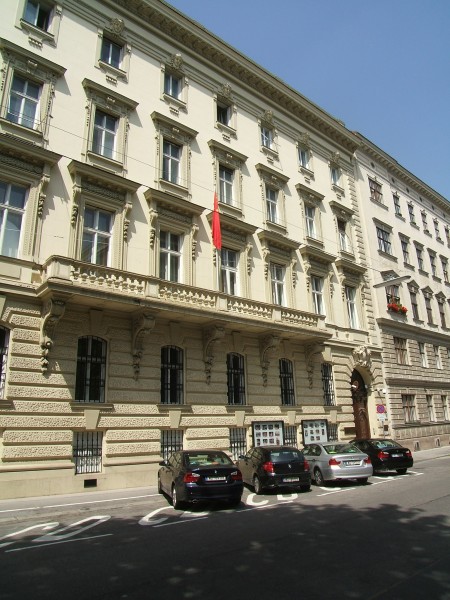Everything You Always Wanted to Know About the Chinese Embassy in Vienna
The Embassy of the People's Republic of China in the Republic of Austria is located at Metternichgasse 4 in the 3rd district of Vienna, near the Belvedere Palace. The building in which the Embassy is located is also known as Palais Bratmann-Thorsch and was formerly the residence of Austrian-Jewish industrialists and bankers.
 The Palais Bratmann-Thorsch was built between 1897 to 1899 by Friedrich Schachner for the industrialist Josef Bratmann. / Picture: © Wikimedia Commons / Erich Schmid [CC BY-SA 3.0 (https://creativecommons.org/licenses/by-sa/3.0)]
The Palais Bratmann-Thorsch was built between 1897 to 1899 by Friedrich Schachner for the industrialist Josef Bratmann. / Picture: © Wikimedia Commons / Erich Schmid [CC BY-SA 3.0 (https://creativecommons.org/licenses/by-sa/3.0)]
Here at the Chinese Embassy Building used to be the private garden to the residence of Klemens Wenzel Lothar von Metternich, who was Foreign Minister and leading minister of the Austrian Empire with the title of State Chancellor until his downfall in the revolutionary year 1848.
After his death the residence and the garden were sold.
The path in the garden was converted into an alley, today's Metternichgasse. Many buildings for noble families were then built here.
Today's embassy building with a floor area of 1433 m2 was formerly the residence of Austrian industrialists and bankers.
The palace was built between 1897 to 1899 by Friedrich Schachner for the industrialist Josef Bratmann.
Only a few years later it came into the possession of the Jewish banker family Thorsch, who had to flee Austria in 1938 and had to leave the artistic furnishings and numerous valuable paintings in the palace.
In 1972, China bought the building shortly after the establishment of diplomatic relations with Austria on May 28, 1971.
The massive, late historicist style building rests on a rusticated base. A wide balcony with balustrade extending over 4 axes is supported by 5 volute consoles. The windows of the Beletage and the floor above have a straight window canopy and richly decorated lintel fields.
Metternichgasse itself was named after Klemens Wenzel Lothar von Metternich.
Metternich was born in Koblenz as the son of the less talented diplomat Franz Georg Karl Count Metternich-Winneburg-Beilstein.
When the family fled in 1794, he came to Vienna, married the granddaughter of former State Chancellor Wenzel Anton Prince von Kaunitz-Rietberg in his first marriage and entered the diplomatic service.
In 1801 Metternich became Austrian envoy in Dresden, then in Berlin (1803 - 1805), and from 1806 to 1809 he represented the interests of the Austrian Empire in Paris. On October 8, 1809, Metternich was appointed Foreign Minister, and at the end of January 1810 he was also appointed State Chancellor.
As one of the main actors of the anti-Napoleonic coalition, he took over the steering of European politics as president of the "Congress of Vienna". As the "coachman of Europe", his influence at the Viennese court grew ever stronger.
For three decades thereafter, Metternich shaped politics in Austria and also in Europe.
Although Metternich was partly opposed to certain measures taken by Police Chief Sedlnitzky, in the public eye he was considered the embodiment of anti-liberal and anti-nationalist forces. By contrast, Kolowrat, who was much more responsible for political repression during the Vormärz period, was even considered liberal. In the Swiss Sonderbund war of 1847, Metternich advocated the suppression of the Protestant-Liberal cantons.
The victory of the liberal forces meant a heavy defeat for Metternich.
In the course of the liberal March Revolution in Austria and most other states of the German Confederation and other European principalities, the revolutionary movement in Vienna succeeded in forcing Metternich to abdicate and leave the country on March 13, 1848.
He fled to London, but returned to Vienna in 1851. Until his death in 1859, he advised the Austrian government under Emperor Franz Joseph I.



